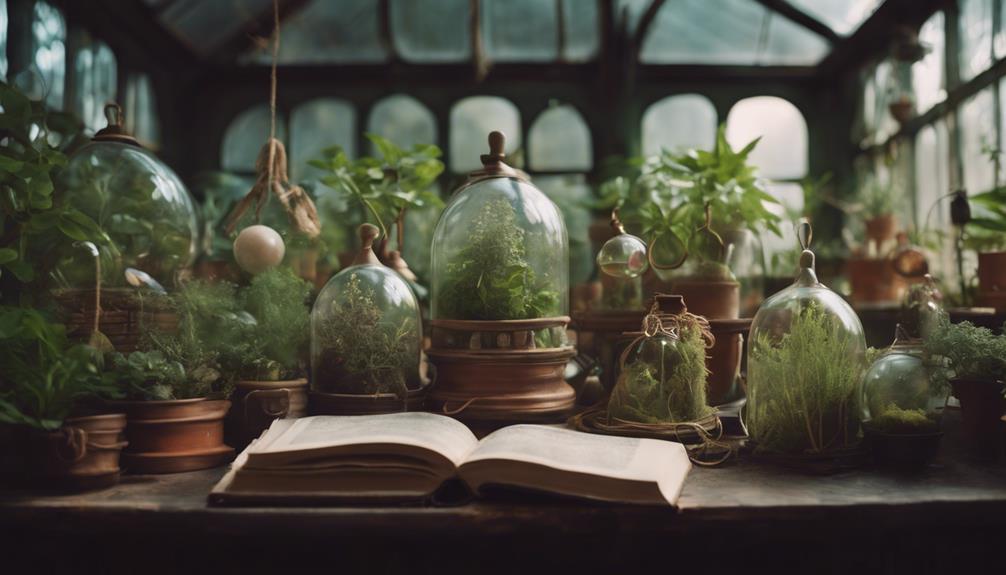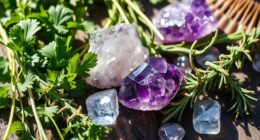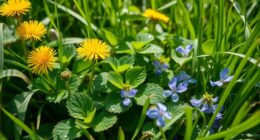Throughout history, herbal healers like Shen Nong, the legendary Chinese herbalist, and Hippocrates, the Greek ‘Father of Medicine,’ shaped early herbal practices. Dioscorides, Avicenna, and Paracelsus built on these foundations with detailed texts and scientific approaches. Popular figures like Culpeper spread herbal knowledge during the Renaissance, while indigenous healers preserve traditional wisdom globally. If you keep exploring, you’ll discover how these pioneers continue to influence herbal healing today.
Key Takeaways
- Shen Nong, ancient Chinese herbalist, authored the *Shen Nong Ben Cao Jing*, foundational to Traditional Chinese Medicine.
- Hippocrates integrated herbal remedies into Greek medicine, emphasizing holistic treatment and natural healing.
- Dioscorides compiled *De Materia Medica*, an influential herbal encyclopedia detailing over 600 medicinal plants.
- Culpeper published *The English Physician* in 1652, democratizing herbal knowledge for the general public.
- Indigenous herbal healers worldwide have preserved traditional plant-based practices through oral transmission and spiritual rituals.
Shen Nong: The Father of Chinese Herbal Medicine
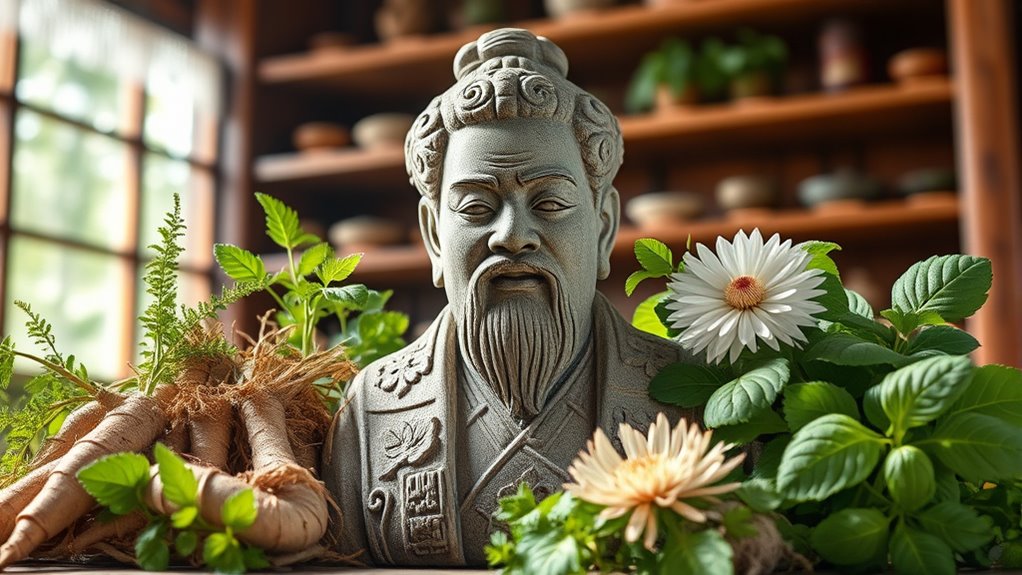
Shen Nong, often called the Father of Chinese Herbal Medicine, played a pivotal role in shaping traditional healing practices. You might not realize that he’s credited with testing hundreds of herbs to determine their medicinal properties, often through direct experience. His efforts led to the compilation of the *Shen Nong Ben Cao Jing*, a foundational text that categorizes herbs based on their nature and effects. You can see his influence in Chinese medicine’s emphasis on balancing qi and harmony with nature. Shen Nong’s discoveries promoted a holistic approach, blending herbal remedies with dietary and lifestyle practices. His work laid the groundwork for centuries of herbal healing in China, making him a central figure whose legacy continues to influence herbal medicine today.
Hippocrates and the Roots of Western Herbal Tradition
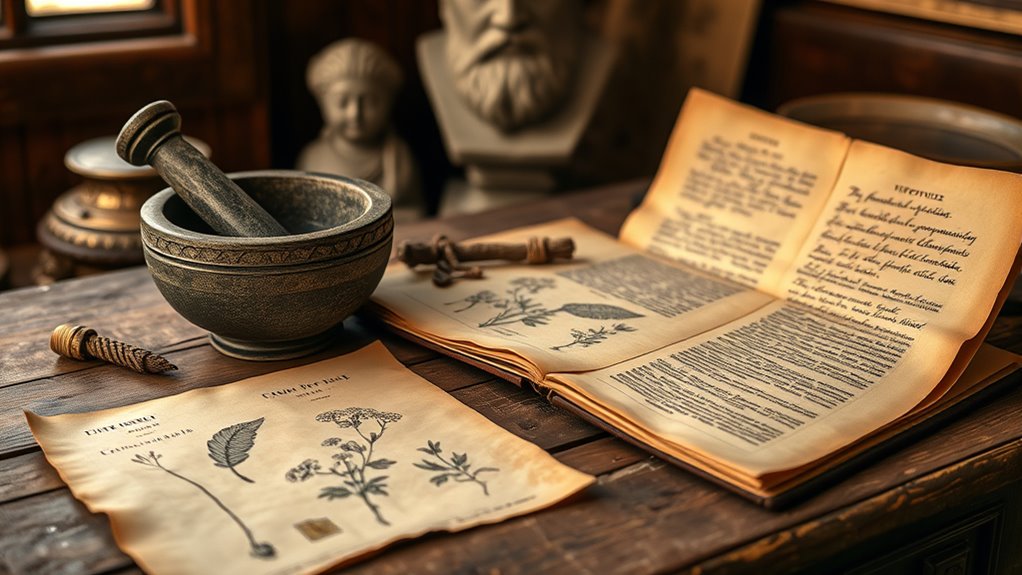
Hippocrates is often called the father of Western medicine, and his herbal practices laid the groundwork for modern healing. His approach combined natural remedies with clinical observation, shaping the core principles of Western herbal traditions. Understanding his contributions helps you see how herbal medicine became a fundamental part of healthcare in the West.
Hippocrates’ Herbal Practices
One of the earliest figures shaping Western herbal medicine is Hippocrates, whose teachings laid the groundwork for integrating plants into healing practices. You learn that he believed in using natural remedies derived from herbs to restore balance and health. Hippocrates emphasized the importance of diet, herbal infusions, and poultices, tailoring treatments to individual needs. His approach focused on treating the whole person, not just symptoms, drawing upon the medicinal properties of plants like mint, garlic, and willow bark. He documented numerous herbal remedies in his writings, setting a precedent for herbal knowledge in Western medicine. His methods emphasized observation, trial, and the therapeutic effects of plants, influencing medical practices for centuries to come.
Foundations of Western Medicine
Building on the early herbal practices of Hippocrates, his work laid the foundation for what would become Western medicine. He emphasized careful observation, diagnosis, and the healing power of natural remedies, merging herbal treatments with clinical practice. Hippocrates introduced the idea that disease results from natural causes rather than supernatural forces, shifting medicine toward a rational approach. His writings organized medical knowledge into systematic methods, influencing later practitioners. The Hippocratic Corpus detailed herbal remedies, diet, and lifestyle changes, shaping the herbal tradition. This approach promoted understanding the human body and the importance of balancing humors. Consequently, Hippocrates’ principles persisted through centuries, inspiring the development of Western medical and herbal practices rooted in observation, natural healing, and scientific inquiry.
Dioscorides and the De Materia Medica
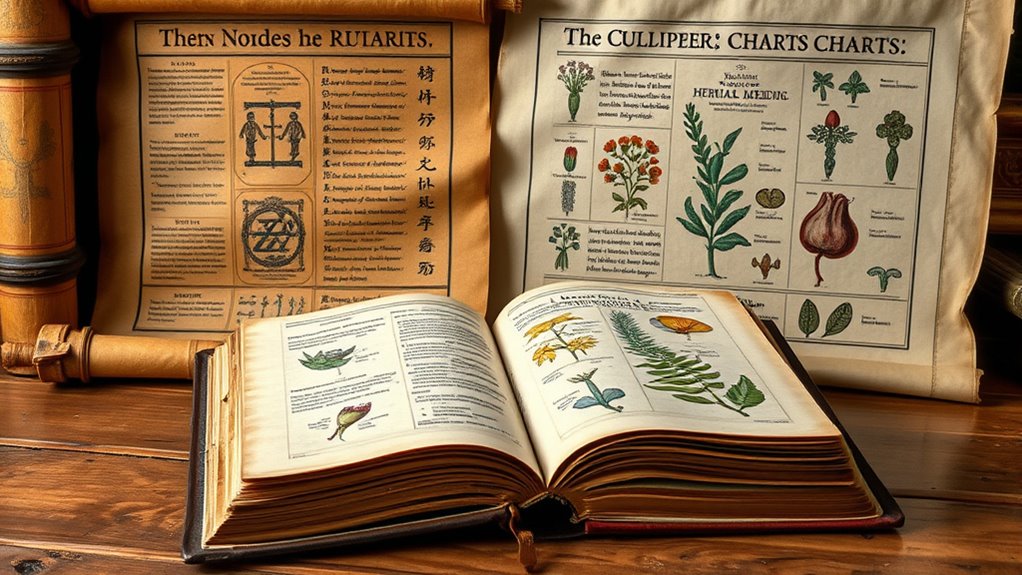
Dioscorides, a Greek physician and pharmacologist of the first century AD, compiled an all-encompassing herbal encyclopedia called *De Materia Medica*. This work became the foundation for herbal medicine in the Western world, cataloging over 600 plants and their uses. You’ll find detailed descriptions, illustrations, and medicinal applications for each herb, making it an invaluable reference for centuries. Dioscorides emphasized practical knowledge, combining observation with experience, which helped standardize herbal practices. His text influenced medical and botanical thought well into the Middle Ages and the Renaissance. You can still see its impact today, as many herbs described by Dioscorides remain staples in herbal remedies. His work bridged ancient herbal knowledge and future herbal pharmacology, shaping how we understand medicinal plants.
Avicenna’s Contributions to Herbal Pharmacology
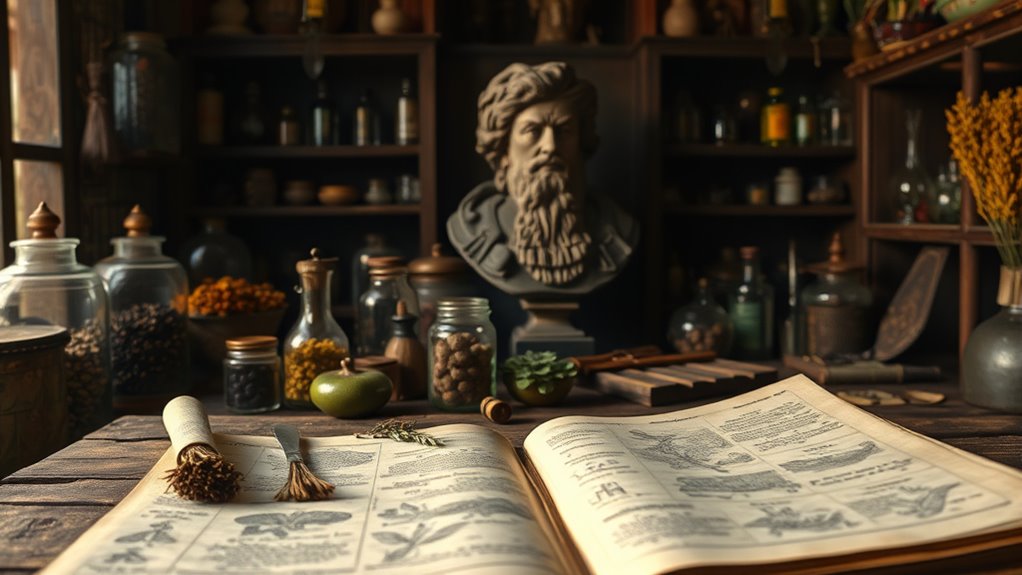
You’ll find that Avicenna’s herbal texts revolutionized medical knowledge by systematically organizing medicinal plants and their uses. His works influenced both his contemporaries and future generations, shaping herbal pharmacology for centuries. Understanding his contributions helps you see how herbal medicine became a foundation for modern medical practices.
Avicenna’s Herbal Texts
Have you ever wondered how medieval scholars advanced herbal medicine? Avicenna, a Persian polymath, made significant strides with his herbal texts. His most famous work, the “Canon of Medicine,” not only covers medical theories but also details numerous herbs, their properties, and uses. He meticulously categorized plants based on their effects, prescribing specific herbs for various ailments. His descriptions went beyond simple recipes; he explored the pharmacological actions of herbs, emphasizing their healing potential. Avicenna’s texts combined practical knowledge with scientific observation, laying a foundation for future herbal pharmacology. His systematic approach helped preserve and transmit herbal knowledge across generations, influencing both Islamic and European medicine. Today, his herbal writings remain a monument to his scholarly rigor and innovative thinking.
Influence on Medicine
Avicenna’s detailed herbal texts didn’t just compile knowledge; they transformed herbal pharmacology into a systematic science with lasting influence. His writings introduced organized classifications of plants and their medicinal properties, setting standards for future herbal studies. By combining empirical observation with theoretical understanding, he laid the groundwork for evidence-based medicine. Avicenna’s integration of herbal remedies into broader medical practices helped establish pharmacology as a essential component of healthcare. His emphasis on accurate dosing, preparation methods, and understanding plant effects advanced the safety and effectiveness of herbal treatments. These contributions shaped medieval and Renaissance medicine, influencing both Eastern and Western traditions. Today, Avicenna’s work remains a cornerstone in herbal pharmacology, inspiring modern research and guiding herbal medicine practices worldwide.
Paracelsus and the Birth of Modern Herbal Practice
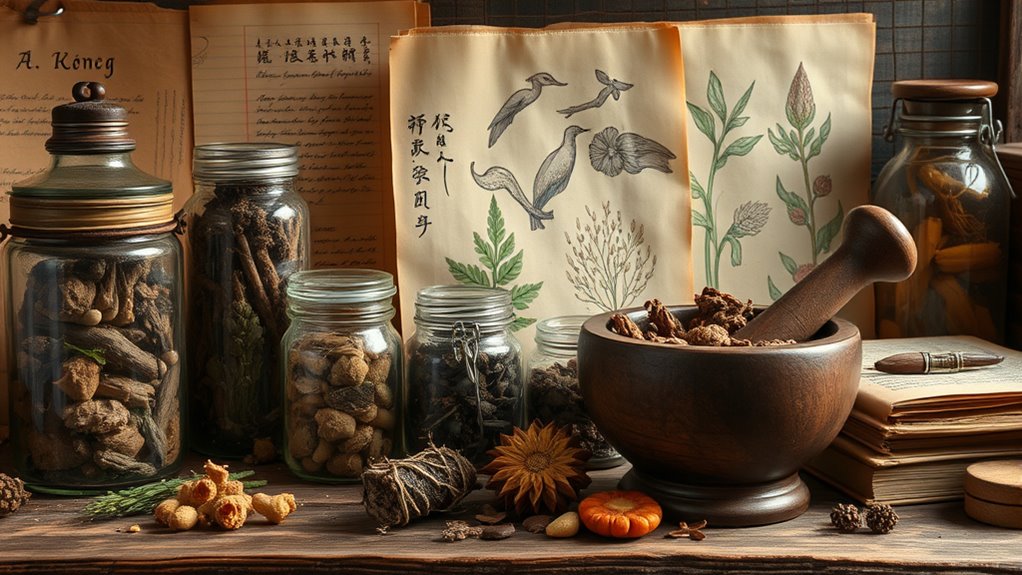
Paracelsus, a Swiss physician and alchemist of the 16th century, revolutionized herbal medicine by emphasizing the importance of direct observation and individual treatment. He challenged traditional herbal theories, advocating that healing depends on understanding the specific qualities of herbs and their effects on each patient. Instead of relying solely on ancient texts, you’re encouraged to study herbs firsthand, experimenting with their properties. Paracelsus believed that nature offers the right remedies for each person’s unique condition, marking a shift toward personalized medicine. His approach laid the groundwork for modern herbal practices, focusing on precise dosing, chemical interactions, and the biological basis of healing. By doing so, he transformed herbal medicine from a mystical art into a scientific discipline.
Nicholas Culpeper: The Herbalist of the English Renaissance

During the English Renaissance, Nicholas Culpeper emerged as a pioneering herbalist who made herbal medicine accessible to ordinary people. He believed that everyone should understand and use plants for healing, not just physicians. Culpeper’s most famous work, the “Complete Herbal,” provided detailed descriptions of plants, their medicinal uses, and illustrations, all written in clear language. He challenged the medical establishment of his time, criticizing the reliance on theory and privileged knowledge. Instead, he emphasized empirical observation and personal experience. Culpeper’s approach empowered laypeople to diagnose and treat common ailments themselves. His work bridged traditional herbal knowledge with the emerging scientific curiosity of the Renaissance, making herbal remedies more democratic and practical. Today, he’s remembered as an influential figure who democratized herbal medicine.
The Role of Herbal Healers in Indigenous Cultures

Throughout history, indigenous cultures have relied on herbal healers as essential custodians of traditional medicine. You’ll find that these healers, often called shamans, medicine men, or women, possess deep knowledge of local plants and their healing properties. They serve as guides, spiritual leaders, and medical practitioners, blending herbal remedies with rituals and spiritual practices. Their role isn’t just about treating physical ailments but also maintaining balance within individuals and their communities. You might observe that their knowledge is passed down orally through generations, ensuring cultural continuity. Their understanding of herbs is intertwined with spiritual beliefs, making their healing practices holistic. In indigenous societies, herbal healers are revered figures, respected for their wisdom and crucial contributions to community health and spiritual well-being.
The Evolution of Herbal Knowledge Through the Ages
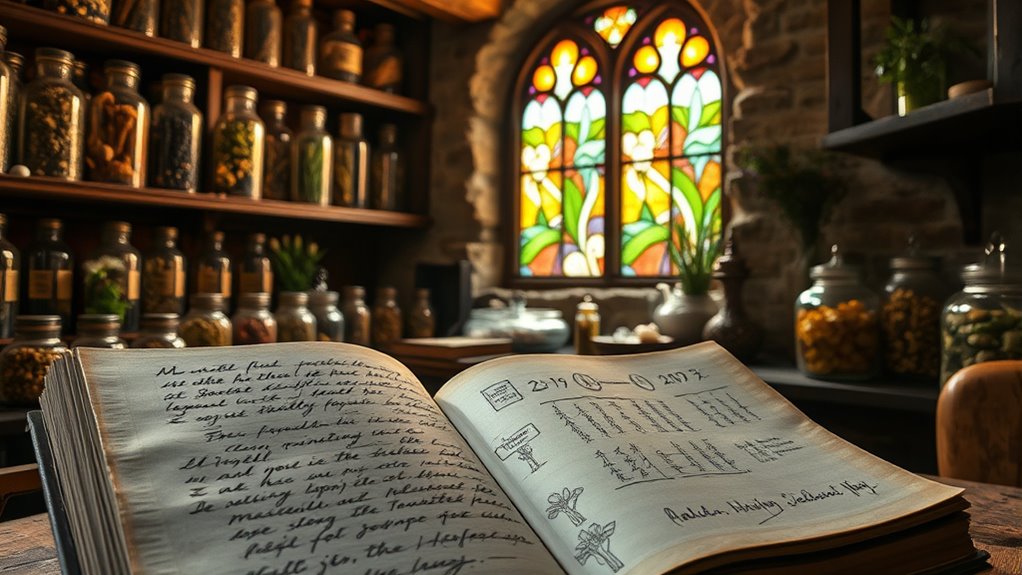
As human societies developed, so did their understanding of medicinal plants, transforming herbal knowledge from simple folk remedies into sophisticated systems of healing. Over centuries, accumulated observations and cultural practices shaped detailed pharmacopoeias and healing theories. Ancient civilizations documented plant properties on clay tablets, papyrus scrolls, and manuscripts, passing knowledge across generations. During the Middle Ages, herbal texts became more systematic, blending superstition with empirical observation. The Renaissance sparked renewed interest, with scholars cataloging herbs and their uses, laying foundations for modern phytotherapy. Scientific inquiry in the 17th and 18th centuries shifted herbal knowledge toward experimentation and classification. Today, herbal medicine continues to evolve, integrating traditional wisdom with scientific research, ensuring that herbal healing remains a crucial part of global healthcare.
Contemporary Herbalists Inspired by Historical Figures

Contemporary herbalists often draw inspiration from the groundbreaking work of historical figures who shaped herbal medicine’s foundation. They incorporate ancient wisdom into modern practices, blending tradition with science. Many study the texts of Shen Nong, Hippocrates, and Culpeper to understand plant properties and uses. These pioneers set the stage for today’s holistic approaches, emphasizing plant-based healing and personal connection. Their influence encourages herbalists to explore new remedies while respecting tradition. To visualize this, consider the following ideas:
| Historical Inspiration | Modern Application | Focus Area |
|---|---|---|
| Ancient texts | Evidence-based practices | Plant identification |
| Traditional formulas | Integrative medicine | Patient-centered care |
| Herbal lore | Sustainable harvesting | Conservation efforts |
Frequently Asked Questions
How Did Ancient Herbal Healers Authenticate Their Medicinal Plants?
You can see that ancient herbal healers authenticated their medicinal plants through careful observation and experience. They relied on visual cues, such as leaf shape, color, and smell, to identify plants correctly. Many also used traditional knowledge passed down through generations, and some might have tested plants’ effects to verify their healing properties. This hands-on approach helped them distinguish genuine medicinal herbs from look-alikes or toxic plants.
What Methods Did Historical Herbalists Use to Document Their Knowledge?
Imagine you’re a gardener mapping a secret garden. You’d carefully sketch each plant, jot down its properties, and note its uses. Historical herbalists documented their knowledge through detailed manuscripts, herbals, and illustrations, like creating a botanical map. They recorded plant characteristics, healing properties, and preparation methods, ensuring their discoveries could guide others. This meticulous record-keeping kept their wisdom alive across generations, much like passing down a treasured, living map of healing herbs.
Did Herbal Practices Differ Significantly Across Cultures?
Yes, herbal practices varied markedly across cultures, reflecting local plants, beliefs, and medicinal traditions. You’ll find that Chinese herbal medicine emphasizes balancing energy, while European practices often focus on humors. Indigenous cultures rely heavily on spiritual and ritualistic methods. These differences influence how treatments are prepared, administered, and understood, showing that herbal healing adapts to cultural contexts, making it a diverse and rich tradition worldwide.
How Have Herbal Remedies Been Integrated Into Modern Medicine?
Imagine stepping into a 21st-century pharmacy and seeing herbal remedies alongside pharmaceuticals. Today, you’ll find herbal medicine integrated through supplements, teas, and extracts, often supported by scientific research. You might even visit a holistic doctor who combines traditional herbs with modern treatments. This blending respects ancient healing wisdom while ensuring safety and effectiveness, making herbal remedies a trusted part of contemporary healthcare for many people like you.
Are There Any Herbal Practices From History Still Used Today?
Yes, many herbal practices from history are still used today. You might find herbal teas, tinctures, and supplements in health stores, and some doctors incorporate herbal remedies alongside conventional treatments. Traditional Chinese medicine and Ayurveda remain popular, emphasizing herbs like ginseng, turmeric, and echinacea. These practices continue to influence modern wellness routines, helping you boost immunity, reduce stress, and improve overall health naturally.
Conclusion
So, you see, these legendary herbal healers shaped history itself, transforming plants into powerful medicine that changed lives forever. From Shen Nong’s divine wisdom to Culpeper’s revolutionary texts, their legacy is nothing short of miraculous. Without them, modern medicine might be just a distant dream. Their stories are your gateway to revealing nature’s greatest secrets—so immerse yourself, and discover the incredible healing powers waiting in every leaf and root around you!



